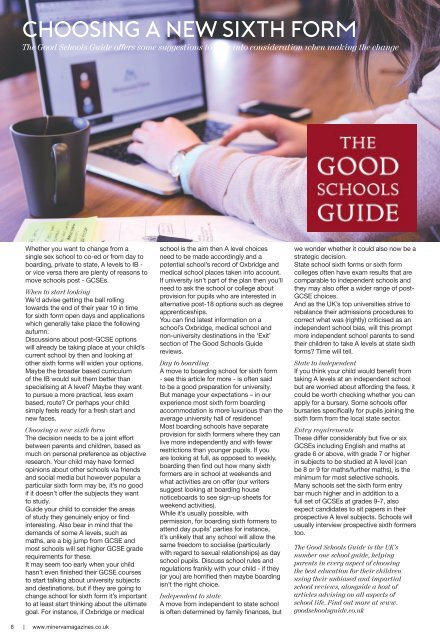Taunton and South Somerset Living Dec 2021 - Jan 2022
At last the Christmas editions are here! With festive fun, gifts and interiors, plus kitchen design advice from Interior Design expert Julia Kendell and an interview with the Yorkshire Shepherdess Amanda Owen. Plus, our competition pages return, with staycations, laundry upgrades, festive hampers and a chance to win tickets to see Paloma Faith in concert!
At last the Christmas editions are here! With festive fun, gifts and interiors, plus kitchen design advice from Interior Design expert Julia Kendell and an interview with the Yorkshire Shepherdess Amanda Owen. Plus, our competition pages return, with staycations, laundry upgrades, festive hampers and a chance to win tickets to see Paloma Faith in concert!
Create successful ePaper yourself
Turn your PDF publications into a flip-book with our unique Google optimized e-Paper software.
CHOOSING A NEW SIXTH FORM<br />
The Good Schools Guide offers some suggestions to take into consideration when making the change<br />
Whether you want to change from a<br />
single sex school to co-ed or from day to<br />
boarding, private to state, A levels to IB -<br />
or vice versa there are plenty of reasons to<br />
move schools post - GCSEs.<br />
When to start looking<br />
We’d advise getting the ball rolling<br />
towards the end of their year 10 in time<br />
for sixth form open days <strong>and</strong> applications<br />
which generally take place the following<br />
autumn.<br />
Discussions about post-GCSE options<br />
will already be taking place at your child’s<br />
current school by then <strong>and</strong> looking at<br />
other sixth forms will widen your options.<br />
Maybe the broader based curriculum<br />
of the IB would suit them better than<br />
specialising at A level? Maybe they want<br />
to pursue a more practical, less exam<br />
based, route? Or perhaps your child<br />
simply feels ready for a fresh start <strong>and</strong><br />
new faces.<br />
Choosing a new sixth form<br />
The decision needs to be a joint effort<br />
between parents <strong>and</strong> children, based as<br />
much on personal preference as objective<br />
research. Your child may have formed<br />
opinions about other schools via friends<br />
<strong>and</strong> social media but however popular a<br />
particular sixth form may be, it’s no good<br />
if it doesn’t offer the subjects they want<br />
to study.<br />
Guide your child to consider the areas<br />
of study they genuinely enjoy or find<br />
interesting. Also bear in mind that the<br />
dem<strong>and</strong>s of some A levels, such as<br />
maths, are a big jump from GCSE <strong>and</strong><br />
most schools will set higher GCSE grade<br />
requirements for these.<br />
It may seem too early when your child<br />
hasn’t even finished their GCSE courses<br />
to start talking about university subjects<br />
<strong>and</strong> destinations, but if they are going to<br />
change school for sixth form it’s important<br />
to at least start thinking about the ultimate<br />
goal. For instance, if Oxbridge or medical<br />
8 | www.minervamagazines.co.uk<br />
school is the aim then A level choices<br />
need to be made accordingly <strong>and</strong> a<br />
potential school’s record of Oxbridge <strong>and</strong><br />
medical school places taken into account.<br />
If university isn’t part of the plan then you’ll<br />
need to ask the school or college about<br />
provision for pupils who are interested in<br />
alternative post-18 options such as degree<br />
apprenticeships.<br />
You can find latest information on a<br />
school’s Oxbridge, medical school <strong>and</strong><br />
non-university destinations in the ‘Exit’<br />
section of The Good Schools Guide<br />
reviews.<br />
Day to boarding<br />
A move to boarding school for sixth form<br />
- see this article for more - is often said<br />
to be a good preparation for university.<br />
But manage your expectations – in our<br />
experience most sixth form boarding<br />
accommodation is more luxurious than the<br />
average university hall of residence!<br />
Most boarding schools have separate<br />
provision for sixth formers where they can<br />
live more independently <strong>and</strong> with fewer<br />
restrictions than younger pupils. If you<br />
are looking at full, as opposed to weekly,<br />
boarding then find out how many sixth<br />
formers are in school at weekends <strong>and</strong><br />
what activities are on offer (our writers<br />
suggest looking at boarding house<br />
noticeboards to see sign-up sheets for<br />
weekend activities).<br />
While it’s usually possible, with<br />
permission, for boarding sixth formers to<br />
attend day pupils’ parties for instance,<br />
it’s unlikely that any school will allow the<br />
same freedom to socialise (particularly<br />
with regard to sexual relationships) as day<br />
school pupils. Discuss school rules <strong>and</strong><br />
regulations frankly with your child - if they<br />
(or you) are horrified then maybe boarding<br />
isn’t the right choice.<br />
Independent to state<br />
A move from independent to state school<br />
is often determined by family finances, but<br />
we wonder whether it could also now be a<br />
strategic decision.<br />
State school sixth forms or sixth form<br />
colleges often have exam results that are<br />
comparable to independent schools <strong>and</strong><br />
they may also offer a wider range of post-<br />
GCSE choices.<br />
And as the UK’s top universities strive to<br />
rebalance their admissions procedures to<br />
correct what was (rightly) criticised as an<br />
independent school bias, will this prompt<br />
more independent school parents to send<br />
their children to take A levels at state sixth<br />
forms? Time will tell.<br />
State to independent<br />
If you think your child would benefit from<br />
taking A levels at an independent school<br />
but are worried about affording the fees, it<br />
could be worth checking whether you can<br />
apply for a bursary. Some schools offer<br />
bursaries specifically for pupils joining the<br />
sixth form from the local state sector.<br />
Entry requirements<br />
These differ considerably but five or six<br />
GCSEs including English <strong>and</strong> maths at<br />
grade 6 or above, with grade 7 or higher<br />
in subjects to be studied at A level (can<br />
be 8 or 9 for maths/further maths), is the<br />
minimum for most selective schools.<br />
Many schools set the sixth form entry<br />
bar much higher <strong>and</strong> in addition to a<br />
full set of GCSEs at grades 9-7, also<br />
expect c<strong>and</strong>idates to sit papers in their<br />
prospective A level subjects. Schools will<br />
usually interview prospective sixth formers<br />
too.<br />
The Good Schools Guide is the UK’s<br />
number one school guide, helping<br />
parents in every aspect of choosing<br />
the best education for their children<br />
using their unbiased <strong>and</strong> impartial<br />
school reviews, alongside a host of<br />
articles advising on all aspects of<br />
school life. Find out more at www.<br />
goodschoolsguide.co.uk


















